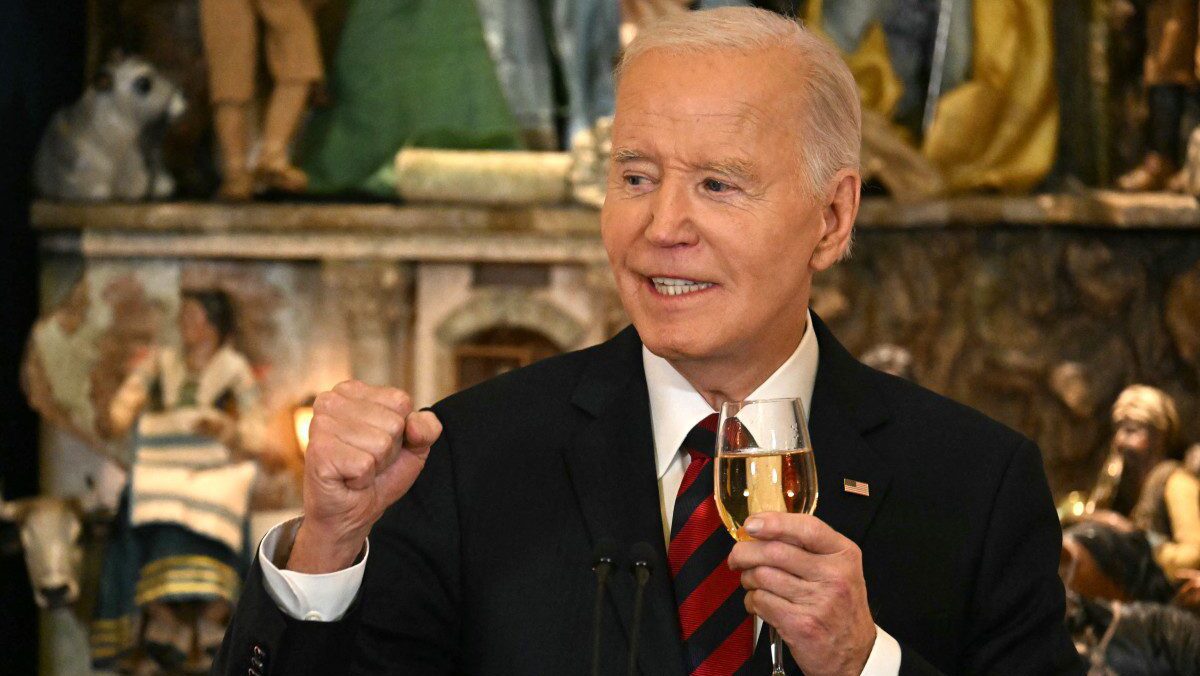
US President Joe Biden makes a toast as he speaks at a Christmas for All Dinner in at the White House in Washington, DC, December 10, 2024.
Photo: Jim WATSON / AFP
If pardoning his son Hunter for any crimes committed over a ten-year period was sticking his toe in the waters, U.S. President Joe Biden on Thursday took a ginormous plunge into the pardoning pool when he commuted the sentences of 1,500 prisoners and granted clemency for 39 non-violent offenders—a record number for a single day.
And even after what journalist Mark Halperin referred to as a “Pardon Fiesta,” Biden is not done:
“I will take more steps in the weeks ahead. My Administration will continue reviewing clemency petitions to advance equal justice under the law, promote public safety, support rehabilitation and reentry, and provide meaningful second chances,” the president said.
A commutation, under U.S. law, removes or reduces a sentence while keeping the conviction intact, while a pardon relieves a person from all legal consequences of a crime.
Biden was widely criticized for pardoning his son Hunter, who had been convicted on tax and felony gun charges, after repeatedly stating that he would not do so. The president motivated his pardon by saying the charges in Hunter’s cases “came about only after several of my political opponents in Congress instigated them to attack me and oppose my election.”
The judge in Hunter Biden’s case, Mark Scarsi, criticized the elder Biden for “rewriting history” and condemned the president’s allegations of political bias on the part of the law enforcement and court officials. Only 22% of Americans approved of the pardon.
2Way TV host and former Democratic Party official Dan Turrentine commented on the Thursday announcement saying President Biden should have led with this massive flood of pardons before letting his son off the hook: “This is what he should have done because you’re setting a tone of forgiveness, of rehabilitation. This is the runway that you would build to slowly go down to ultimately do Hunter.”
Contrary to online claims, Thursday’s pardon did not include Chinese national Shanlin Jin, who had been convicted for possession of child pornography. Biden did grant Jin clemency—but it happened in late November as part of a prisoner swap with the Chinese.
According to media sources, the Biden administration is now also considering “preemptive pardons” of, among others, former Wyoming Rep. Liz Cheney, who led the January 6th committee, and COVID Czar Anthony Fauci, to protect them from potential prosecution once President-elect Donald Trump takes office. Critics have warned that preemptive pardons could set a dangerous precedent, and experts have questioned whether such pre-pardons are legal—or desirable: Accepting a pardon can, to some degree, be seen as an admission of guilt—something the individuals involved are unlikely to want to acknowledge.
Dace Potas, a columnist with USA Today, also warned about the possible long-term fallout of such a move:
What is being suggested in this case is a blanket pardon for all crimes that the Trump Justice Department may decide to prosecute. The unintended consequences of such a pardon, such as undiscovered heinous crimes that any one of these individuals might have committed, are far too severe to toy with.
